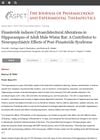Search
for
Sort by
Research
450-480 / 619 results
research Polycystic Ovary Syndrome, Insulin Resistance, and Obesity: Navigating the Pathophysiologic Labyrinth
Insulin resistance and obesity are key factors in the development and worsening of polycystic ovary syndrome, and lifestyle changes are important for managing it.

research Ephrins Negatively Regulate Cell Proliferation in the Epidermis and Hair Follicle
Ephrins slow down skin and hair follicle cell growth.

research Demethylation of Methionine and Keratin Damage in Human Hair
Copper and iron cause keratin damage in hair by converting methionine to homocysteine.

research Accelerated Wound Healing Using Nanoparticles
Nanoparticles can speed up wound healing and deliver drugs effectively but may have potential toxicity risks.

research Itpr3 Is Responsible for the Mouse Tufted (tf) Locus
The Itpr3 gene causes a specific hair pattern in mice.

research Comparative Gene Expression Profiling of Senescent and Androgenetic Alopecia Using Microarray Analysis
SA linked to mitochondrial issues and oxidative stress, while AGA involves disrupted hair growth genes.

research Multimodal Imaging of Hair Follicle Bulge-Derived Stem Cells in a Mouse Model of Traumatic Brain Injury
Hair follicle stem cells might help treat traumatic brain injury.

research Finasteride Induces Cytoarchitectural Alterations in Hippocampus of Adult Male Wistar Rat: A Contributor to Neuropsychiatric Effects of Post-Finasteride Syndrome
Finasteride may cause memory problems by damaging the hippocampus.
research Increased Anxiety-Like Phenotype in Female Guinea Pigs Following Reduced Neurosteroid Exposure In Utero
Female guinea pigs exposed to less allopregnanolone before birth showed more anxiety-like behavior.

research The Effect of Finasteride on the Male Rat Brain
Finasteride affects the male rat brain by reducing certain protein activation, but these effects may reverse after stopping the drug.

research A Family Business: Stem Cell Progeny Join the Niche to Regulate Homeostasis
Stem cell offspring help control their parent stem cells, affecting tissue health, healing, and cancer.

research Isotope Dilution-Based Targeted and Nontargeted Carbonyl Neurosteroid/Steroid Profiling
Researchers created a new method to measure brain steroids, finding higher levels of certain steroids and changes due to a drug.

research Cleave But Not Leave: Astrotactin Proteins in Development and Disease
Astrotactin proteins are important for brain and skin development and are linked to several neurodevelopmental disorders.

research Psychotropic Treatment of Psychodermatologic Disorders
Psychotropic drugs can help treat skin conditions affected by mental health, but dermatologists must use them carefully due to side effects and patient concerns.

research The Effect of Administration and Discontinuation of Finasteride in Male Rats
Finasteride's negative effects on brain tissue in male rats may be reversible after stopping the drug.

research Stem Cells in the Body
Stem cells regenerate tissues and their behavior varies by environment, suggesting the hematopoietic system model may need revision.

research Investigation of the Crosstalk Between Proteasome Function and Nucleotide Excision Repair Mechanism During Aging
The document concludes that the discussed biological mechanisms and potential therapies are not related to hair loss or hair growth.

research Vitamin D and Human Health: Lessons from Vitamin D Receptor Null Mice
Mice without the vitamin D receptor have bone issues and other health problems, suggesting vitamin D is important for preventing various diseases in humans.

research The Nuclear Vitamin D Receptor: Biological and Molecular Regulatory Properties Revealed
The vitamin D receptor is crucial for bone health and affects various body systems, with mutations potentially leading to disease.

research Melatonin Membrane Receptors in Peripheral Tissues: Distribution and Functions
Melatonin affects many body functions beyond sleep by interacting with specific receptors in various tissues.

research Complications of Cushing's Syndrome: State of the Art
Cushing's syndrome can cause serious health problems, and early treatment is crucial, but some issues may remain after treatment.

research Treatment of Invasive Aspergillosis with Itraconazole
Itraconazole is potentially effective for treating invasive aspergillosis, but more research is needed.

research Genetic, Hormonal, and Metabolic Aspects of PCOS: An Update
The document concludes that insulin resistance is key in PCOS development and early treatment is crucial to prevent complications.

research Hair Follicle Aging Is Driven by Transepidermal Elimination of Stem Cells via COL17A1 Proteolysis
Hair loss and aging are caused by the breakdown of a key protein in hair stem cells.

research Timing of Expression of the Core Clock Gene Bmal1 Influences Its Effects on Aging and Survival
The timing of when the gene Bmal1 is active affects aging and survival, with its absence during development, not adulthood, leading to premature aging.

research The Human Tri-Peptide GHK and Tissue Remodeling
The peptide GHK-Cu helps heal and remodel tissue, improves skin and hair health, and has potential for treating age-related inflammatory diseases.

research Cartilage to Bone Transformation During Fracture Healing Is Coordinated by the Invading Vasculature and Induction of the Core Pluripotency Genes
Blood vessels and specific genes help turn cartilage into bone when bones heal.

research Tregs: Where We Are and What Comes Next?
The conclusion is that Treg-targeted therapies have potential, but more knowledge of Treg biology is needed for effective treatments, including for cancer.

research Indications for a Brain-Hair Follicle Axis: Inhibition of Keratinocyte Proliferation and Up-Regulation of Keratinocyte Apoptosis in Telogen Hair Follicles by Stress and Substance P
Stress can cause hair loss by negatively affecting hair follicles and this effect might be reversed with specific treatments.